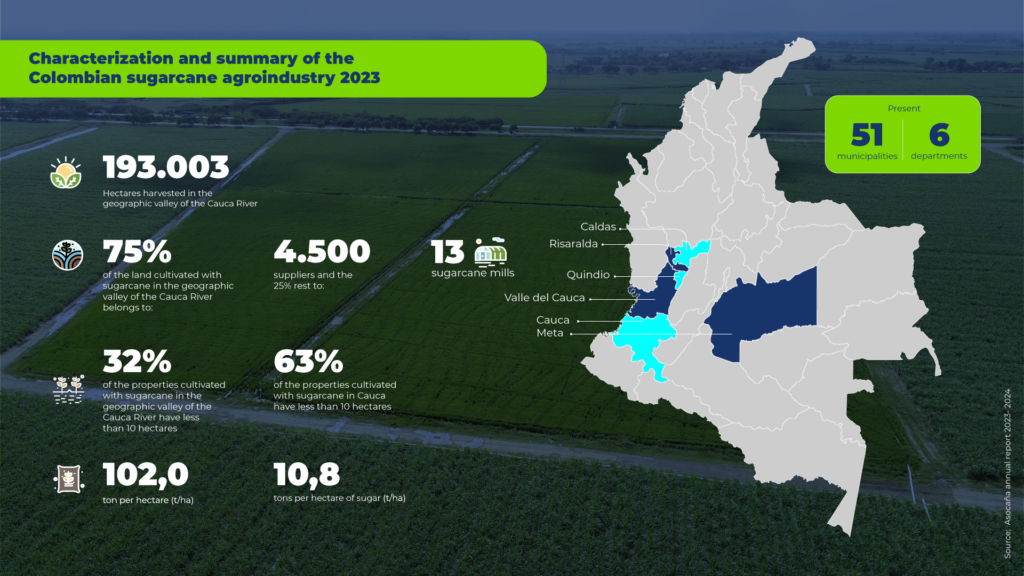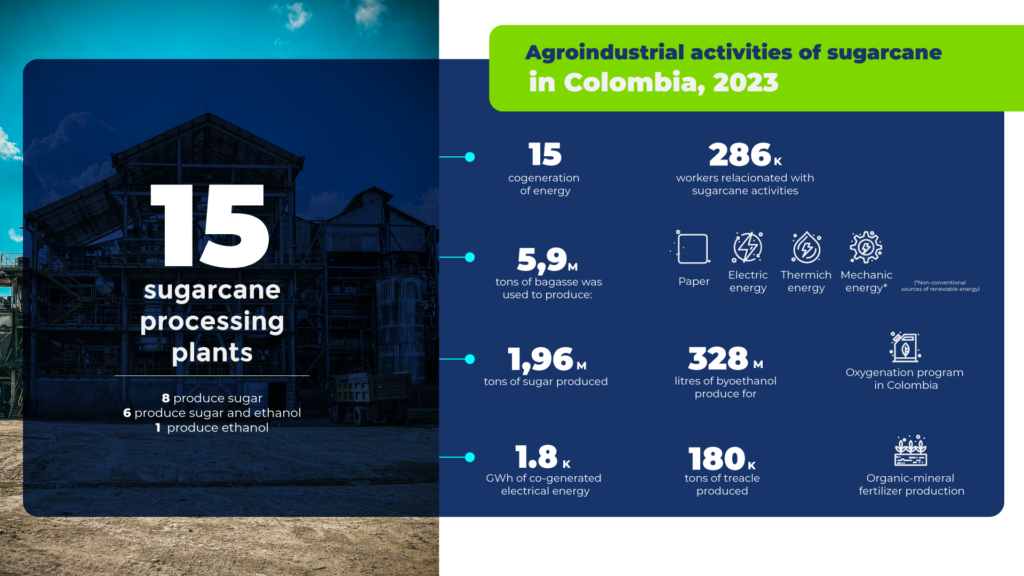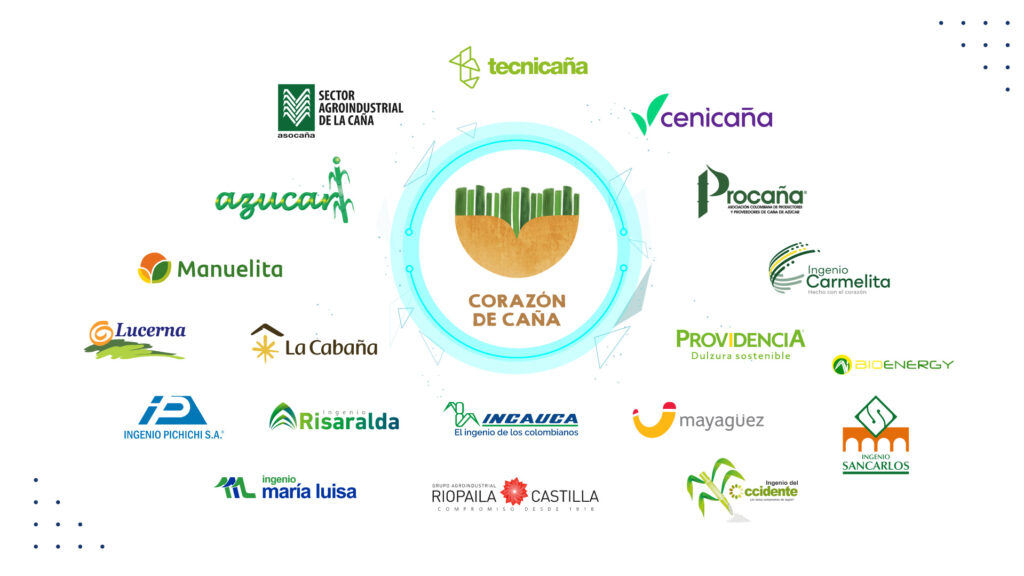
The sugarcane agroindustry in Colombia is one of the most important pillars of the national economy and a benchmark in Latin America and the world. This sector is comprised of 14 sugar mills, 3700 sugar cane growers, associations, Bioenergy and a research center, all working together.
Located primarily in the department of Valle del Cauca, a region blessed with a favourable climate and fertile soils, the industry also extends into parts of the Cauca and Risaralda departments. This strategic location not only enables efficient, high-quality production but also turns the region into a driving force for economic and social development, creating jobs and providing livelihoods for thousands of families.
The importance of the sector goes beyond its economic impact; sugarcane is a key crop for the production of bioenergy and co-products, contributing to the transition towards a greener and more sustainable economy.
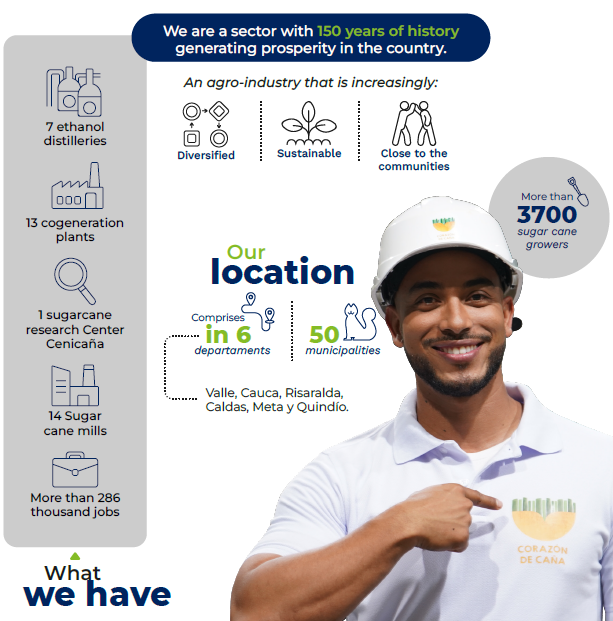
During 2023, bioethanol production and sales decreased, while imports increased significantly. As a result, the consumption of fuel alcohol to oxygenate Colombian gasoline was 39.7% higher than in 2022.
In terms of energy cogeneration, in 2023, sugar mills produced 1,800 tonnes of sugar mills produced 1,800 GWh of electricity, an increase of 3.2% over 2022 with 811 GWh of surplus to the national grid interconnected system. Undoubtedly, agro-industrial cogeneration offers a renewable and stable source of energy a renewable and stable source of energy for the country. Undoubtedly, agro-industrial cogeneration offers a renewable and stable source of energy a renewable and stable source of energy for the country.
Since 2018, the sugarcane agroindustrial sector has been engaged in research on the production of biogas from vinasse, a by-product of the process of obtaining fuel alcohol. It is estimated that this initiative could generate up to 80 million cubic metres of biogas, which is equivalent to 40 % of the residential gas consumption in Valle del Cauca. This biogas has several possible of application, such as its use in boilers, in the transport of sugar cane and its injection into the domestic natural gas.
The sugarcane agroindustry is committed to sustainability, coordinating efforts to align actions with public policies and a unified regional vision. Different programmes and strategies are focus on improving living conditions and the sustainable use of natural resources. Each year, we invest significant resources in innovation, research and new technologies, promoting the use of circular economy and the conservation of 26 watersheds as well as adapting to climate change.
We actively support local economies and more than 700 regional businesses, contributing significantly to the well-being and development of vulnerable rural communities.
Associations of the Colombian sugarcane agroindustry
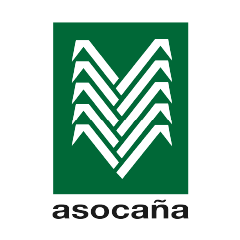
The Association of Sugarcane Growers of Colombia, Asocaña, is a non-profit union entity founded on February 12, 1959, whose mission is to represent the agroindustrial sugarcane sector and promote its evolution and sustainable development.
Visit: asocana.org

We are the Colombian Association of Sugarcane Technicians. We provide training and transfer activities to the sector, taking advantages of the synergies and economics of scale that are generated by bringing together all the actors of agro around the topic of general interest.
Visit: tecnicana.org

The Colombian Sugacane Research Center, is a private, non profit corporation, founded in 1977. It´s financing resources correspond to direct donations made by 13 sugar mills and their cane suppliers.
Visit: cenicana.org

The Colombian Association of Sugarcane Producers and Suppliers, founded in 1973, is a non profit trade association, representing natural and legal business that grow sugarcane. The mission of Procaña is represent the interests of producers and suppliers of the sugar cane agro-industrial sector before public and private entities in matters of regulation and legislation.
Visit: procana.org

The Association of Cane Growers Committee of the Risaralda Sugar Mill
